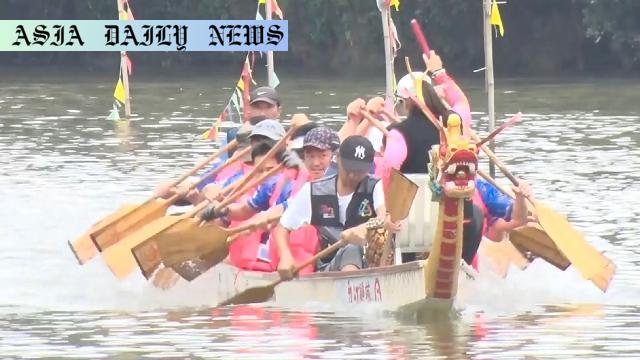Dragon Boat Race brings together Japanese and Chinese individuals to foster mutual exchanges.
Key Point 1: Dragon Boat Race held in Guangdong aims to strengthen Japan-China friendships.
Key Point 2: Over 630 participants, including Japanese and Chinese employees, competed in the vibrant event.
Key Point 3: Tight security ensured safety amidst rising concerns after last year’s incident.
Key Point 4: Japanese officials like Consul General Kijima Yoshiko highlighted cultural exchange value.

A Celebration of Cultural Exchange: The Dragon Boat Race in Guangdong
The southern Chinese city of Foshan in Guangdong Province recently played host to a vibrant and culturally significant dragon boat race. Taking place on a Saturday, this annual event drew record-breaking participation, with over 630 individuals coming together to celebrate tradition while fostering international friendship. Organized by the Consulate-General of Japan and the Japanese Chamber of Commerce in Guangzhou, the event was designed to strengthen Japan-China exchanges through the shared appreciation of a centuries-old Chinese tradition.
Participants included Japanese and Chinese employees of Japan-affiliated companies and their families. This diverse turnout highlighted the event’s success in uniting individuals from different backgrounds. Each dragon-shaped boat, manned by a crew of 20, raced over a 200-meter stretch as rowers offered their full effort to secure a victory. The camaraderie and teamwork evident in the competition emphasized the unifying power of cultural events like these.
Fostering Unity Amid Challenges
While the lively atmosphere of the dragon boat race radiated excitement and joy, it was held against a backdrop of caution. Last September, a fatal attack on a Japanese student in nearby Shenzhen sparked security concerns. As a result, security at the venue was notably tight this year. This heightened vigilance ensured the safety and well-being of all participants and onlookers, allowing the event to proceed smoothly.
Japanese Consul General Kijima Yoshiko eloquently spoke of the event’s significance, emphasizing the role such activities play in fostering cultural understanding. These interactions have a ripple effect, creating lasting impressions of mutual respect and collaboration between citizens of Japan and China. The dragon boat race, with its spirit of unity and friendly competition, served as a testament to the positive outcomes achievable through shared experiences.
The Participant Perspective: A Memorable Experience
For many, the dragon boat race was far more than just a sporting event. A Japanese participant noted the profound sense of teamwork he experienced, remarking that he felt a strong connection with his crew despite the competitive nature of the race. He expressed interest in participating again next year, this time with aspirations of winning. Testimonials like this underscore the event’s ability to bring people together, transcending national and cultural boundaries.
The underlying message of unity and cooperation was as impactful as the event itself. The dragon boat race served not only as a celebration of Chinese tradition but also as a platform for cultivating goodwill, understanding, and mutual respect. As the event continues to grow in participation and prominence, it holds the potential to become a cornerstone of cultural exchange between the two nations.



Commentary
The Iconic Role of Dragon Boat Racing in International Exchange
The recent dragon boat race in Foshan, Guangdong, showcases the incredible potential of cultural events as bridges between nations. Set against the backdrop of centuries-old tradition, this unique race blended the vibrancy of Chinese heritage with the aspirations of fostering deeper connections between Japanese and Chinese participants. It is heartening to see such efforts focused on commonalities, creating opportunities for citizens of two countries to connect on a personal level and celebrate shared values.
Unity Amidst Diversity: A Powerful Message
The participation of over 630 individuals, including Japanese and Chinese employees, reveals the deep interest and commitment to cultural exchange. Watching crews work together in perfect coordination to navigate their dragon-shaped boats was not just a spectacle but also a lesson in unity. Events like these bridge divides and offer a glimpse into how teamwork transcends national and cultural boundaries, a much-needed reassurance in a world often marked by tension and division.
Looking Beyond the Surface
However, the race itself is only part of the story. The heightened security following last year’s tragic incident in Shenzhen reflects the challenges events like these may face in light of geopolitical or local tensions. Nonetheless, the willingness of both nations to ensure the event went ahead is a testament to resilience and an abiding belief in the value of cultural diplomacy. It’s a reminder that even amidst difficulties, the arts, sports, and heritage often act as powerful tools for connection and reconciliation.
The dragon boat race in Guangdong was not merely a competition; it was a vivid reminder of the shared humanity of individuals striving together for better understanding. Its success offers hope that such meaningful exchanges will continue to grow, fostering goodwill and collaboration for years to come.